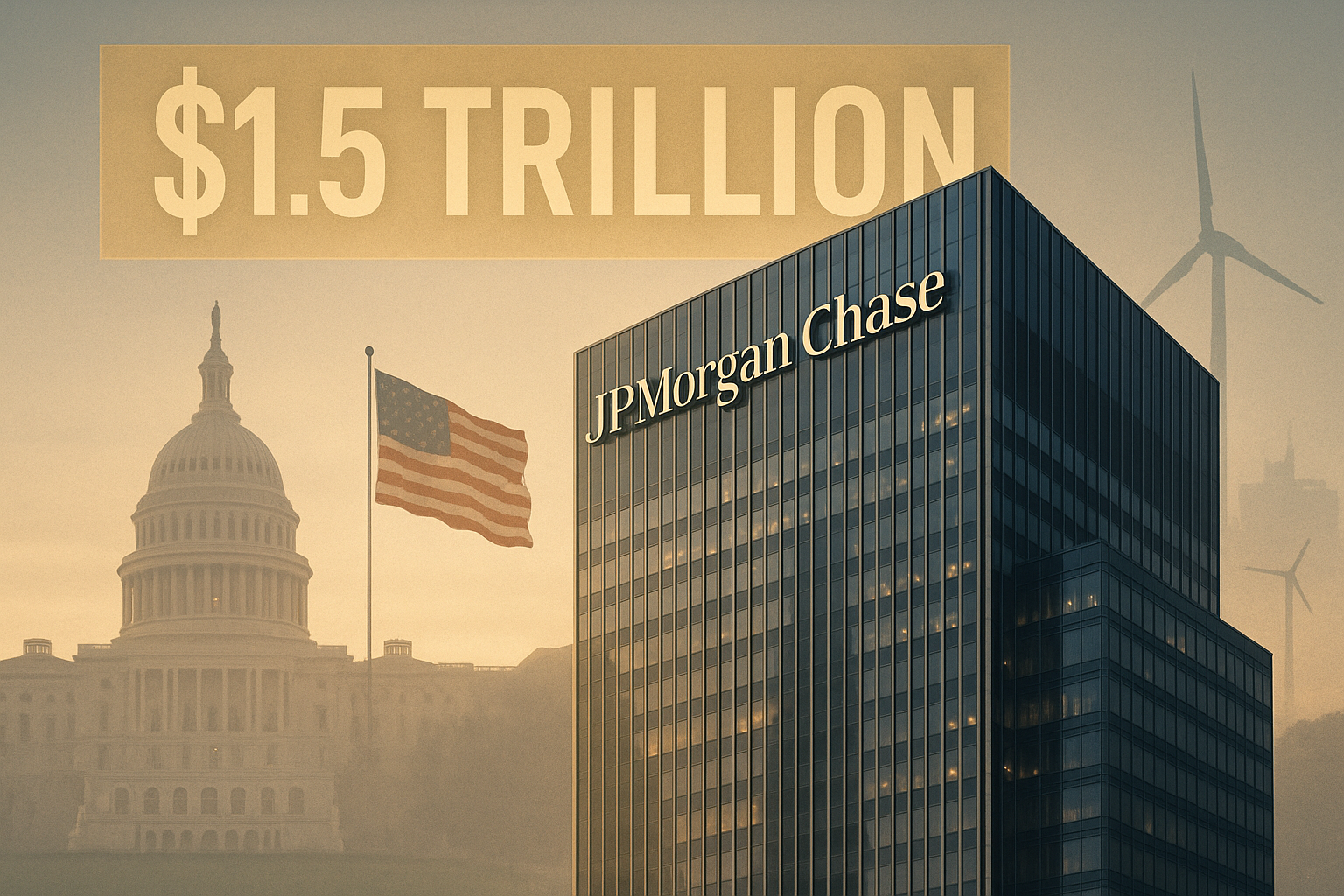Jamie Dimon has thrown down the gauntlet. And it's a heavy one.
JPMorgan Chase just announced a staggering 10-year, $1.5 trillion investment initiative focused on American national security—a figure so large it makes you wonder if someone accidentally added an extra zero. They didn't. We're talking trillion with a capital T.
To put this in perspective, that's roughly the entire GDP of Canada. It's about 7% of total U.S. GDP. It dwarfs the Pentagon's annual budget seven times over. JPMorgan isn't just a bank anymore; it's positioning itself as America's financial defense department, just with better suits and quarterly earnings calls.
I've covered Wall Street's evolution for years, and this move represents something fundamentally new—or perhaps something very old dressed up in contemporary clothes. Banks and national power have always been intertwined, but rarely has the connection been stated so explicitly.
The Expanding Definition of "Security"
So what exactly counts as national security in JPMorgan's worldview? That's where things get... interesting.
The traditional Cold War definition—tanks, spies, and missile silos—has expanded considerably. These days, "national security" encompasses everything from semiconductor factories to climate resilience to social media algorithms. It's become Washington's magic phrase, the "Open Sesame" that unlocks bipartisan support when mere "economic development" gets eye rolls.
Look, what we're witnessing is what I call "regulatory arbitrage through patriotic rebranding." (Forgive the jargon, but sometimes only technical terms capture the essence.) Companies have figured out that the same old business activities receive much warmer receptions from regulators when wrapped in the American flag.
"We've always invested in America," a senior JPMorgan executive told me last week, requesting anonymity to speak candidly. "But there's a new understanding that private capital is essential to maintaining America's global position." When I pressed for specifics on what constitutes a "national security investment," the answers remained—how shall I put it?—flexible.
Wall Street Goes to Washington
JPMorgan isn't pioneering this approach. Defense contractors have been playing this game since Eisenhower warned about the military-industrial complex. What's fascinating is watching the financial sector adopt their playbook with such enthusiasm.
The timing isn't coincidental. This announcement arrives as:
U.S.-China relations deteriorate rapidly Tech competition intensifies across global markets "Made in America" makes its political comeback Corporate "friendshoring" becomes the strategy du jour Wall Street faces increased regulatory scrutiny
Dimon—no stranger to political positioning—has identified the perfect moment to reframe JPMorgan's core business as patriotic duty. And honestly? It's brilliant corporate strategy.
When I attended a banking conference in New York last month, the hallway conversations were dominated by regulatory concerns. Now JPMorgan has potentially found a way to transform regulatory headwinds into tailwinds by draping itself in national security importance.
Security Theater: Financial Edition
There's an element of theater here that can't be ignored. The announcement is notably light on specifics. Will financing a chip fabrication plant count toward this initiative? Almost certainly. What about luxury condos in Manhattan purchased by foreign investors? Probably not—though I wouldn't be surprised if someone in JPMorgan's real estate division tries to make that case.
This ambiguity serves JPMorgan well. It provides maximum flexibility to count virtually any domestic investment toward this headline figure while maintaining the patriotic halo effect.
I mean, when a bank announces it will invest $1.5 trillion in anything over ten years, you should recognize this includes much of what they'd be doing anyway. It's like me announcing my ambitious "continue eating food" initiative that I plan to maintain indefinitely.
(The bank, for its part, declined to specify what percentage of this investment represents new direction versus existing business plans reframed.)
The Pentagon Playbook
What's particularly striking is how financial institutions are adopting defense contractors' approach to budgeting and public relations. Defense companies have long understood that big, long-term numbers create their own gravity. A program costing billions over decades becomes politically untouchable—too entrenched to cancel.
By announcing a decade-long commitment of this magnitude, JPMorgan creates a self-fulfilling prophecy. Regulators will hesitate to impede initiatives that could "undermine national security investments." Politicians will compete to direct portions of this funding toward their districts.
I've seen this strategy play out in defense contracting for years. The F-35 fighter jet program—despite cost overruns and technical issues—became too big to fail. JPMorgan seems to be applying this same principle to finance.
But here's the million-dollar (or trillion-dollar) question: will this massive investment actually enhance American security? Or is this simply providing patriotic cover to business as usual?
The truth—messy as it always is—probably lies somewhere in between. Some genuine security enhancement will occur, embedded within normal banking operations rebranded for maximum political advantage.
One thing is certain: in finance, as in security, perception creates its own reality. And Jamie Dimon is banking on exactly that.
